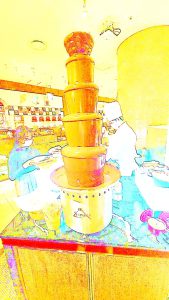物語:無名の詩人たちの連環
- 2024.12.14
- 月刊芳美
物語:無名の詩人たちの連環
かつて、ある未来の都市では言葉が奪われ、詩が忘れ去られていた。すべての言語は一つの規範的な声に統制され、人々の表現は単調な記号の繰り返しに成り果てていた。誰も自分の声で語らず、誰も他者の声を聴こうとはしない。言葉が枯渇した世界では、希望もまた、姿を消していた。
その中で、地下に隠れるようにして暮らす少人数の集団がいた。彼らは自らを「連詩会」と呼んでいた。彼らは言葉の断片を拾い集め、連歌の形式で詩を紡ぐことで、自分たちの失われた声を取り戻そうとしていた。
第一夜:断片の収集
集団のリーダーであるミズホは、廃墟となった図書館からボロボロの詩集を拾い上げた。その詩は、意味の断片しか残されていなかったが、彼女はその「欠け」を美しいと感じた。
「欠けたものこそ、私たちの声を映し出すのではないか」と彼女は仲間に語りかけた。
仲間たちはミズホの言葉に触発され、街中の看板や広告、古い記録の一部から言葉を拾い集め、即興で詩を詠み合うことを始めた。誰かが「闇の中で」と詠めば、次の者が「欠けた月が目を覚ます」と応じた。それぞれの言葉は一見すると矛盾していたが、全体として一つの詩を形作っていく。
第二夜:夢と現実の交錯
ある夜、集団の一人であるアキラは、奇妙な夢を見た。夢の中では、彼が詠んだ言葉が具現化し、街の瓦礫が花に変わり、人々の抑圧された感情が虹のように空を満たしていった。しかし、現実の街は荒廃したままだ。
「どうすればこの夢を現実にできるのか」とアキラは思い悩む。彼の葛藤を聞いたミズホはこう答えた。
「夢は現実の裏側にある連歌よ。矛盾しているように見えるけれど、それが繋がれば新しい世界が見えるの。」
第三夜:パラドックスの解放
集団はさらに活動を広げ、詩の断片を壁に書き、音楽に乗せ、隠れて暮らす市民たちに伝えていった。矛盾した言葉たちは、現実の硬直した意味を解体し、見る者の想像力を揺さぶった。
ある時、彼らの詩が都市の監視者たちに見つかった。「この無意味な言葉遊びは反乱の兆しだ」と彼らは言う。しかし監視者たちも次第にその詩に惹かれ、取り締まるどころか耳を傾け始める。「なぜか分からないが、これを読んでいると胸がざわつく」と彼らは言った。
最終夜:革命の詩人たち
やがて、街中に詩が満ちるようになった。詩はただの文字列ではなく、踊りとなり、絵画となり、音楽となり、人々がそれぞれの声を取り戻す媒体となった。その瞬間、連詩会の詩人たちは気づいた。彼らの詩が革命そのものになったのだと。革命は暴力ではなく、矛盾と断片を愛し、それを共に紡ぐ行為として現れた。
「矛盾とは終わりではなく、始まりだ。私たちはこれを語り続けるだろう」とミズホは言い、次の詩の一句を詠んだ。
結び:詩の連環
この物語は、連歌の共同性とシュルレアリスム的なパラドックスの力を統合し、創造的な革命の可能性を描いています。矛盾に満ちた現代でも、断片的な声や欠けた意味を拾い上げ、共に詩を紡ぐことで新しい世界の兆しを見出せるというメッセージを伝えています。
💕
The Tale of the Nameless Poets’ Chain
In an era when words were stripped away and poetry forgotten, there existed a city shrouded in silence. Language had been reduced to a sterile, regulated monotony, and expression had dissolved into lifeless symbols. No one spoke with their own voice, and no one listened to another’s. A world drained of language was also a world devoid of hope.
Yet hidden beneath the city, a small collective of souls defied this suffocating silence. They called themselves The Chain of Poets. Together, they sought to reclaim their stolen voices by weaving verses in the ancient form of renga, where fragments of words were joined to create something larger than themselves.
The First Night: Gathering Fragments
Mizuho, the leader of the group, scavenged the ruins of an abandoned library and uncovered a tattered book of poetry. Its pages were incomplete, with words and phrases missing, leaving only broken echoes of meaning. But to Mizuho, the gaps in the text were not flaws; they were spaces for new voices to emerge.
“It is within the fragments,” she told her companions, “that we can rediscover our lost voices. Let us embrace what is missing, for it mirrors our own silenced truths.”
Inspired by her vision, the group began to collect stray words from forgotten places—fragments of graffiti on crumbling walls, weathered advertisements, remnants of old songs. They brought these fragments together and began composing poems. One would begin with, “In the darkness,” and another would add, “the broken moon awakens.” The verses were disjointed yet strangely harmonious, as if their contradictions gave them life.
The Second Night: Dreams Intertwined with Reality
One night, Akira, one of the poets, dreamed a vivid and surreal vision. In the dream, the words they had spoken transformed into a blossoming garden, where emotions long suppressed shimmered in the air like an iridescent mist. The dream felt so real that upon waking, Akira was overwhelmed with the desire to make it tangible.
“How can we bring this dream into reality?” Akira asked.
Mizuho replied, “A dream is like a hidden verse in a renga, a fragment waiting to connect with something unseen. If we weave it together with the fragments of others, perhaps it will find its form.”
The Third Night: Releasing the Paradox
The group’s poetry spread like an underground current, reaching the ears of those still hiding in the shadows of the city. They painted their verses on walls, whispered them in dark alleys, and wove them into melodies. Their disjointed words dismantled the rigid meanings imposed by the authorities, stirring a flicker of imagination in the hearts of those who encountered them.
Soon, even the city’s enforcers—tasked with quelling dissent—found themselves captivated by the poems. Though they claimed to act in the name of order, they could not help but be moved. “I cannot explain it,” one confessed, “but these words awaken something within me.”
The Final Night: Poets of the Revolution
As the poems spread, they transformed the city itself. No longer merely words, the verses became dance, painting, music—a kaleidoscope of expression that freed the voices of all who encountered them. The Chain of Poets realized that their poetry had become more than art; it had become revolution.
“This is not the end but the beginning,” Mizuho declared, offering a final verse:
“Fragments converge, a chorus of shadows.
The silence shattered, a thousand voices rise.
We are the poets of the unbroken chain.”
Epilogue: The Eternal Chain
This tale embodies the collective spirit of renga and the paradoxical power of surrealism. Even in a world fractured by silence, fragmented voices can come together to weave something whole. Through shared creation, the nameless poets transformed their despair into a radiant revolution, where contradictions became the seed of endless possibility.
